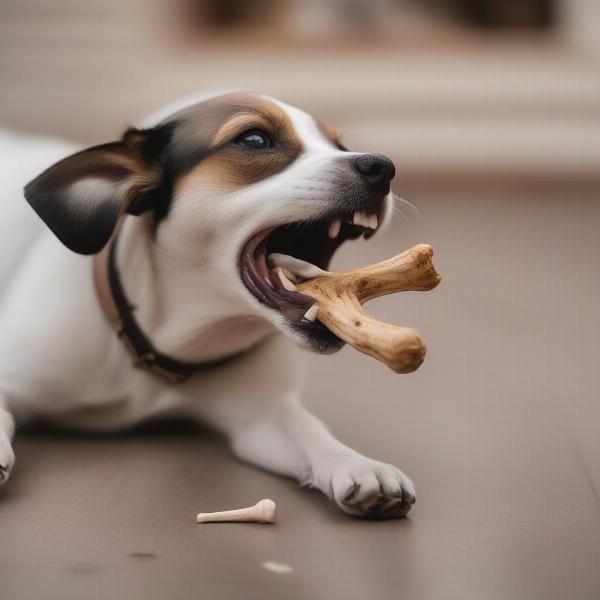Choosing the right dog bones for your small breed companion can be a daunting task. With so many options available, it’s important to understand which bones are safe, nutritious, and appropriately sized for your little dog. This guide will help you navigate the world of dog bones for small dogs, ensuring your furry friend gets the best and safest chewing experience.
Understanding the Benefits of Dog Bones for Small Breeds
Chewing is a natural instinct for dogs, especially small breeds. Providing appropriate chew toys, like dog bones, offers numerous benefits:
- Dental Health: Chewing helps scrape away plaque and tartar, promoting healthy teeth and gums. This is particularly important for small dogs, who are prone to dental issues.
- Mental Stimulation: Chewing provides a healthy outlet for boredom and anxiety, preventing destructive behaviors like excessive barking or chewing on furniture.
- Jaw Strength: The act of chewing strengthens jaw muscles and provides a satisfying physical activity.
- Entertainment: A good chew bone can keep your small dog entertained for hours, providing a healthy and enjoyable pastime.
 Choosing Dog Bones for Small Breeds
Choosing Dog Bones for Small Breeds
Choosing the Right Size and Type of Bone for Small Dogs
The size of the bone is crucial. A bone that’s too large can be a choking hazard, while a bone that’s too small can be swallowed whole. Look for bones specifically designed for small breeds. Here’s a breakdown of suitable bone types:
- Dental Chews: Designed specifically for dental health, these chews come in various shapes and sizes, often flavored to entice chewing.
- Natural Bones: Opt for rawhide alternatives like bully sticks, which are digestible and less likely to splinter. Avoid cooked bones, as they can splinter and cause serious internal injuries.
- Synthetic Bones: Nylon or rubber bones offer a durable and long-lasting chewing option. Choose those specifically designed for small dogs to prevent choking.
Safety Tips for Giving Your Small Dog a Bone
While dog bones offer many benefits, safety is paramount. Follow these guidelines:
- Supervise Your Dog: Always supervise your dog while they are chewing on a bone.
- Inspect the Bone Regularly: Check the bone for wear and tear, and discard it if it becomes too small or splintered.
- Choose Digestible Options: Opt for digestible chews to minimize the risk of intestinal blockage.
- Limit Chewing Time: Don’t allow your dog to chew on a bone for extended periods, as this can lead to jaw fatigue or dental problems.
- Consult Your Veterinarian: If you have any concerns about your dog’s chewing habits or suitable bone choices, consult your veterinarian. They can provide personalized recommendations based on your dog’s breed, size, and health.
What if my Small Dog Swallows a Bone?
If your small dog swallows a bone, contact your veterinarian immediately. This is a serious situation that requires professional attention. Symptoms of a swallowed bone can include vomiting, loss of appetite, and abdominal pain.
Conclusion
Choosing the right dog bones for small dogs is essential for their health and well-being. By following the guidelines in this article, you can ensure your small breed companion enjoys the benefits of chewing safely and happily. Remember to always prioritize safety, supervise your dog, and choose appropriate bone sizes and types. best bones for small dogs can greatly benefit your furry friend’s overall health and happiness.
FAQ
- What are the best chew bones for small dogs? Bully sticks, dental chews, and small nylon bones are good choices.
- Can small dogs have rawhide bones? Rawhide can be a choking hazard and is not easily digestible. Opt for safer alternatives like bully sticks.
- How often should I give my small dog a bone? This depends on the type of bone and your dog’s chewing habits. Supervise your dog and follow the manufacturer’s recommendations.
- What should I do if my small dog breaks a tooth on a bone? Contact your veterinarian immediately.
- Are there any specific dog bones recommended for senior small dogs? best chew bones for small dogs often cater to different age groups. Look for softer chews designed for senior dogs.
- Can I give my small dog a cooked bone? No, cooked bones are dangerous as they can splinter and cause internal injuries. Stick to rawhide alternatives or synthetic bones.
- What are some good alternatives to traditional dog bones for small dogs? yak cheese dog chew are a long-lasting and healthy alternative.
ILM Dog is your one-stop resource for all things dog-related. We offer expert advice on dog breeds, health, training, nutrition, grooming, and much more. We also offer a wide selection of bakers dog treats. Whether you’re a new dog owner or a seasoned expert, ILM Dog is here to help you provide the best possible care for your canine companion. Contact us today at [email protected] or +44 20-3965-8624. Learn more at ILM Dog.